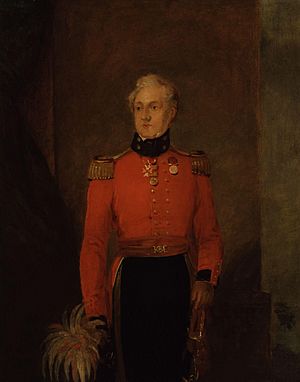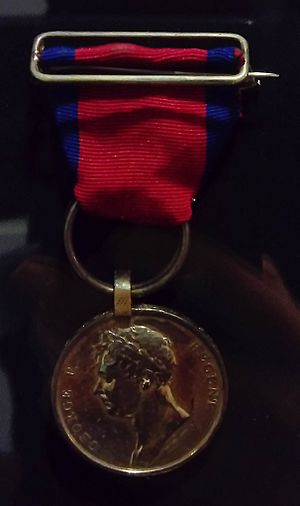Charles Rowan facts for kids
Quick facts for kids
Sir Charles Rowan
|
|
|---|---|

Portrait by William Salter
|
|
| Commissioner of Police of the Metropolis | |
| In office 7 July 1829 – 1850 Serving with Richard Mayne
|
|
| Monarch | George IV William IV Victoria |
| Prime Minister | The Duke of Wellington The Earl Grey The Viscount Melbourne Robert Peel Lord John Russell |
| Home Secretary | Robert Peel The Viscount Melbourne Baron Duncannon The Duke of Wellington Henry Goulburn Lord John Russell The Marquess of Normanby Sir James Graham and others |
| Preceded by | Office created |
| Succeeded by | Richard Mayne and William Hay |
| Personal details | |
| Born | c.1782 County Antrim |
| Died | 8 May 1852 London, United Kingdom |
| Resting place | Kensal Green Cemetery, London, United Kingdom |
Lieutenant-Colonel Sir Charles Rowan (circa 1782 – 8 May 1852) was an important officer in the British Army. He fought in the Peninsular War and at the famous Battle of Waterloo. Later, he became one of the very first leaders, called a Commissioner, of the London Metropolitan Police. He helped create the modern police force we know today.
Contents
Rowan's Family Life
Charles Rowan was one of ten sons born to Robert Rowan. His family had Scottish roots but lived in Ireland. Several of his brothers also had important careers. For example, his brother William became a Field Marshal, a very high rank in the army. Another brother, James, became a Chief Police Magistrate in Gibraltar.
Early Military Career
Charles Rowan was born in County Antrim, Ireland. He joined the army in 1797, becoming an ensign in the 52nd Regiment of Foot. He quickly moved up the ranks, earning promotions for his bravery and skill in battle.
Rowan fought in the Napoleonic Wars, including campaigns in Sicily and Sweden. He also served in the Peninsular War, taking part in many battles like Corunna and Salamanca. He was known for his leadership in the Light Brigade.
At the Battle of Waterloo, a huge and decisive battle, Rowan was the second-in-command of his regiment. He was wounded during the fighting. For his excellent service, he received the Companion of the Bath (CB) award. After the wars, he retired from the army in 1822.
Creating London's Police Force
In 1829, a new police force was being created for London. Sir Robert Peel, the Home Secretary, chose Charles Rowan to be its first senior Commissioner. Peel likely picked Rowan because of his strong military background. He believed Rowan could bring the discipline and organization needed for a new police force.
Rowan worked alongside Richard Mayne, a lawyer. Rowan provided the military structure, while Mayne brought legal knowledge. They became close friends and worked together for twenty years. Their teamwork helped build a strong foundation for the new police.
Setting Up the Metropolitan Police
Rowan and Mayne started their new jobs on July 7, 1829. They quickly set up their offices and homes at 4 Whitehall Place. In just twelve weeks, they did an amazing job. They recruited, trained, organized, and equipped almost a thousand police officers.
They created rules, decided on pay, designed uniforms, and found police stations. Rowan used his military experience to divide London into police areas. These areas were then split into smaller sections and even smaller "beats." This "beat system" meant that officers were always close by, covering every part of the city. It was based on military tactics for light infantry.
Rowan also made sure the police wore blue uniforms, which looked more civilian than military red and gold. This was a smart choice because many people worried about having a uniformed police force. He insisted that his officers be well-trained and behave very professionally. They had to treat the public with respect and kindness. On September 29, 1829, the new police force began patrolling the streets of London.
Rowan as Commissioner
Charles Rowan served as Commissioner for 21 years. The early years were tough. The new police force faced opposition from some politicians and local officials. Many local magistrates and parishes did not want to lose their old ways of policing.
Over time, the Metropolitan Police gained public trust and support. In 1835, the Home Secretary, Lord John Russell, even agreed to pay officers who were injured while on duty. This showed how much the government now supported the police.
In 1848, Rowan's hard work was recognized. He was made a Knight Commander of the Bath (KCB), a very important honor. He retired in 1850 at nearly 68 years old. Sir Charles Rowan passed away in London on May 8, 1852. He was buried at Kensal Green Cemetery.
Rowan was a quiet man who enjoyed fishing and shooting. He helped create a police force that was fair, disciplined, and served the public. His legacy continues to influence policing today.
Images for kids
 | Ernest Everett Just |
 | Mary Jackson |
 | Emmett Chappelle |
 | Marie Maynard Daly |




